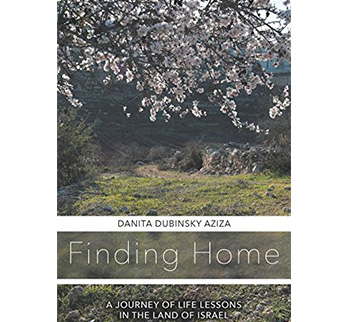Danita Dubinsky Aziza’s Finding Home, A Journey of Life Lessons in the Land of Israel, an account of her family’s four years living in Israel, can perhaps be described as a cautionary tale. It is one thing to be living in Canada, be heavily involved in Zionist activity and visit Israel regularly. It is quite another matter to actually live there.
As Aziza notes in the book, growing up in Moose Jaw and Calgary, she was constantly taught in Hebrew school that as a Jew, Israel was her homeland. Her parents supported Israel both financially and through volunteer roles in Zionist organizations.
She visited Israel for the first time when she was 16. Later, her younger brother had his bar mitzvah there.
While studying at university in Toronto, she went on a UJA Federation of Greater Toronto mission.
She was back in Israel for her honeymoon – her husband, Michel Aziza, is from a Moroccan family in Toronto with many relatives in Israel – and also for her son, Benjy’s, bar mitzvah.
But when it came to actually living in Israel, Aziza says that she never really felt comfortable.
The problem, she said, was not the danger of living in a war zone, the infamous bureaucracy, the well-known Israeli bluntness (that’s not the Canadian way) or the heat. The major problem for her was never becoming comfortable speaking Hebrew. “Being able to speak the language is essential. Not being fluent in Hebrew, even though almost everybody spoke English, left me feeling a little like an outsider.
“Life in Israel was, for me, both an enriching experience and very frustrating. I gained an appreciation for the immigrant experience, and I learned an incredible amount about Israelis and myself.”
The book covers a wide range of her experiences and adjustments, such as getting used to everybody minding her business and always offering advice and a helping hand, dealing with contractors and bureaucracy, and the worry generated from having a son in the IDF and from having parents left behind in Canada.
On the positive side, she writes about how easy it is to make friends in Israel and the joys of celebrating yom tovim and special days in the Jewish homeland.
“Israel is often misunderstood,” she writes. “It is not what you see on television nor is it like what you experience when you go to visit for a few weeks. It is a deeply enriching, complex and unique place.”
Aziza also writes about how Israel changed her. She learned patience and acceptance, and she learned to overcome her fears and timidity.
She also intersperses chapters about growing up in Moose Jaw and Vancouver, and attending university in Toronto.
Aziza notes that she and her husband had always planned to make aliyah. One of the first questions he had for her when they started dating was whether or not she would be willing to make aliyah.
One of the reasons that they moved to Winnipeg in 2002 – in addition to a job offer for Michel – is that the cost of living was less than in Toronto and they would be better able to save enough money for aliyah.
The immediate impetus to go to Israel was a health emergency. Michel underwent triple bypass surgery, and Aziza made a vow that when he recovered they would finally make aliyah.
Thus, in 2008, they packed up the family – Benjy, older sister Tali and younger sister, Rachel – and set off. Initially, the plan was to go for just a year. After a year, they extended their stay and decided to sell their house in Winnipeg. They built a new home for themselves in Even Yehuda, a community near Netanya.
While Tali and Benjy adapted well – Benjy enlisted in the IDF – and Michel went into business with a couple of partners, younger daughter, Rachel, had a harder time of it.
Nonetheless, after more than three years, the family seemed set to stay in Israel, but two factors changed the equation.
First, both of Michel’s business partners died within a year of each other. He accepted a new position with an Israeli company who wanted to break into the North American market. That meant, for him, commuting back and forth between Israel and Winnipeg, which raised concern on Aziza’s part about the possible effect on his health.
Then there was the realization that their daughter Rachel’s unhappiness was a result of Aziza’s own unhappiness, a feeling that she had been in denial about until that moment.
Leaving Israel was one of the most difficult choices that Aziza ever had to make. “A friend suggested that I just tried too hard,” she says. “I wanted so badly to integrate. I was too hard on myself.”
Coming back to Winnipeg, she says, was like slipping on a pair of comfortable old shoes.
Back home, Danita and Michel are once again quite involved in working for Israel. Michel was the inspiration for last year’s Winnipeg solidarity mission to Israel at the height of Operation Protective Edge.
And, ironically, Aziza says, Rachel went back to Israel with the Gray Academy’s P2G program and gained “a newfound appreciation for Israel and Israelis and a new perception of all that is exceptional and beautiful about Israel.”
She says, “I tried to be open and honest about my struggles with Israeli culture and lifestyle. I think I presented a realistic picture of what life in Israel is like for olim.”
The book is available in Toronto at Israel’s Judaica and online through Aziza’s website.
A portion of the proceeds from the sale of the book is going to the Forgotten People Fund in Netanya that supports Ethiopian families in need.
